英语一般疑问句
英语中一般疑问句
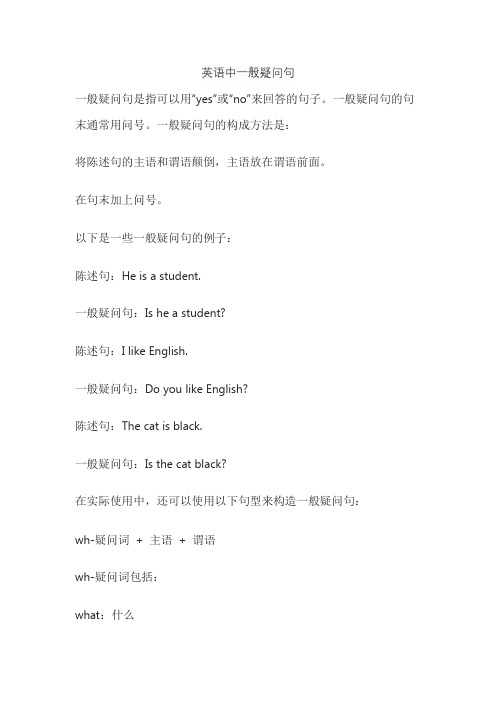
英语中一般疑问句
一般疑问句是指可以用“yes”或“no”来回答的句子。
一般疑问句的句末通常用问号。
一般疑问句的构成方法是:
将陈述句的主语和谓语颠倒,主语放在谓语前面。
在句末加上问号。
以下是一些一般疑问句的例子:
陈述句:He is a student.
一般疑问句:Is he a student?
陈述句:I like English.
一般疑问句:Do you like English?
陈述句:The cat is black.
一般疑问句:Is the cat black?
在实际使用中,还可以使用以下句型来构造一般疑问句:
wh-疑问词+ 主语+ 谓语
wh-疑问词包括:
what:什么
who:谁
where:在哪里
when:什么时候
why:为什么
how:如何
以下是一些使用wh-疑问词构造一般疑问句的例子:陈述句:The book is on the table.
一般疑问句:What is on the table?
陈述句:The man is my father.
一般疑问句:Who is your father?
陈述句:I went to the park yesterday.
一般疑问句:When did you go to the park?
陈述句:I like to eat apples.
一般疑问句:Why do you like to eat apples?
陈述句:I can run very fast.
一般疑问句:How fast can you run?。
英语一般问句和特殊问句的构成
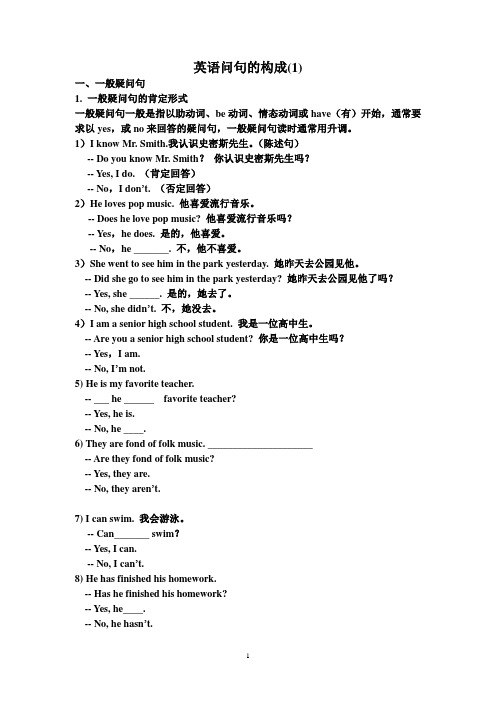
英语问句的构成(1)一、一般疑问句1. 一般疑问句的肯定形式一般疑问句一般是指以助动词、be动词、情态动词或have(有)开始,通常要求以yes,或no来回答的疑问句,一般疑问句读时通常用升调。
1)I know Mr. Smith.我认识史密斯先生。
(陈述句)-- Do you know Mr. Smith?你认识史密斯先生吗?-- Yes, I do. (肯定回答)-- No,I don’t. (否定回答)2)He loves pop music. 他喜爱流行音乐。
-- Does he love pop music? 他喜爱流行音乐吗?-- Yes,he does. 是的,他喜爱。
-- No,he _______. 不,他不喜爱。
3)She went to see him in the park yesterday. 她昨天去公园见他。
-- Did she go to see him in the park yesterday? 她昨天去公园见他了吗?-- Yes, she ______. 是的,她去了。
-- No, she didn’t. 不,她没去。
4)I am a senior high school student. 我是一位高中生。
-- Are you a senior high school student? 你是一位高中生吗?-- Yes,I am.-- No, I’m not.5) He is my favorite teacher.-- ___ he ______ favorite teacher?-- Yes, he is.-- No, he ____.6) They are fond of folk music. _____________________-- Are they fond of folk music?-- Yes, they are.-- No, they aren’t.7) I can swim. 我会游泳。
英语一般疑问句的概念与构成方法
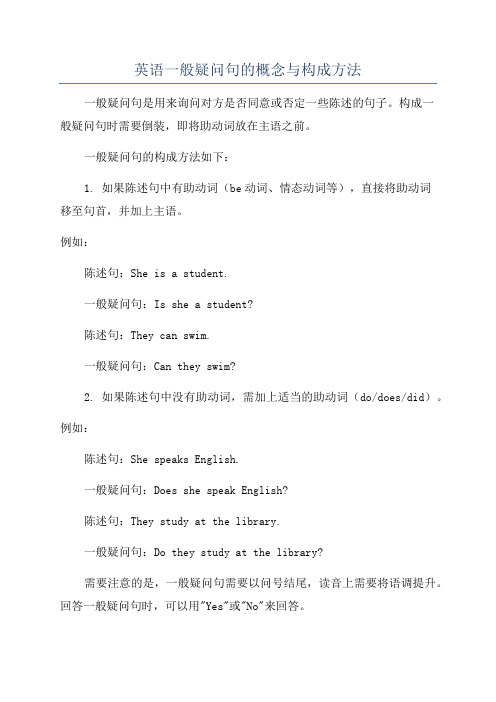
英语一般疑问句的概念与构成方法
一般疑问句是用来询问对方是否同意或否定一些陈述的句子。
构成一
般疑问句时需要倒装,即将助动词放在主语之前。
一般疑问句的构成方法如下:
1. 如果陈述句中有助动词(be动词、情态动词等),直接将助动词
移至句首,并加上主语。
例如:
陈述句:She is a student.
一般疑问句:Is she a student?
陈述句:They can swim.
一般疑问句:Can they swim?
2. 如果陈述句中没有助动词,需加上适当的助动词(do/does/did)。
例如:
陈述句:She speaks English.
一般疑问句:Does she speak English?
陈述句:They study at the library.
一般疑问句:Do they study at the library?
需要注意的是,一般疑问句需要以问号结尾,读音上需要将语调提升。
回答一般疑问句时,可以用"Yes"或"No"来回答。
英语一般疑问句

英语一般疑问句:一般疑问句是疑问句的一种。
它是指用yes或no来回答的句子。
其结构是:系动词be/助动词/情态动词+主语+其他成分?如: Is this your pen? Yes, it is./No, it isn't.注意:1.将陈述句变为一般疑问句时,如句中有be 动词(am is are …)时,可直接将它们提至主语前。
如主语为第一人称,应将其改为第二人称。
如:I'm in Class 2 Grade 1.→ Are you in Class 2 Grade 1?We're watching TV.→ Are you watching TV?2.陈述句中有情态动词(can may must …)时,也可直接将它们提至主语前,即可成为一般疑问句。
如:He can swim now.→ Can he swim now?Yes,he can./No,he can’t.The children may come with us.→ May the children come with us?Yes,they may.3.陈述句中只有一个实义动词作谓语(即句中没有be 动词或情态动词(can may must …)时,且其时态为一般现在时,变为一般疑问句时要在句首加do或does(主语是单数第三人称时),主语后的实义动词用原形。
如:I like these animals.→ Do you like these animals?She wants to go to the movies.→ Does she want to go to the movies?4.一般疑问句一般读升调(↑)5.一般疑问句有时不用yes或no 回答。
Are they in town now?I think so.May I sit here?Certainly.Does he like soccer?Sorry I don't know.一、一般疑问句一般疑问句也可称为“yes /no questions”,因这种问句通常用yes /no来回答,相当于汉语中的“……吗?”其语序是:系动词be /助动词/情态动词+主语+其他成分?如:Are you from Japan?Yes,I am./No,I'm not.Is her sister doing her homework now?Yes,she is./No,she isn't.Does he work in a bank?Yes,he does./No,he doesn't.Do you live near your school?Yes,I do./No,I don't.Can you speak French?Yes ,I can./No,I can't.May I go home now?Yes,you may./No,you mustn't.如何变一般疑问句:1. 首先找BE动词(am, is, are, was, were),把它提到句首, 小写改大写,原来的大写改小写,句末加问号。
英语各种疑问句详细解释——_一般疑问句、特殊疑问句、选择疑问句、反意疑问句

各种疑问句的详细介绍疑问句(questions)指提出问题,请对方回答的句子。
疑问句句末要用问号。
按结构可分为四种:一般疑问句、特殊疑问句、选择疑问句、反意疑问句。
(一)一般疑问句1、一般疑问句概述一般疑问句(general questions),也可称为“yes/no” questions(是否型问句),因为它一般是由yes或no回答的,如:—Can you swim to the other side?你能游到对岸吗?—Yes, I can.是的,我能。
—No,I can’t.不,我不能。
—Have you locked the door?你锁门了吗?—Yes,I have.是的,锁了。
—No,I haven’t. 不,没有锁。
2一般疑问句的结构(1)基本的结构为:be/助动词/情态动词+主语+谓语/表语+(其他),句子要读升调,如:Are they your friends?他们是你的朋友吗?Does he go to school on foot?他是步行去上学吗?Will you be free tonight?你今晚有空吗?Can you play basketball?你会打篮球吗?(2)陈述句亦可用作一般疑问句,多用在非正式文体中,句末有问号,用升调,如:Somebody is with you?有人和你一起吗?He didn’t finish the work?他没有做完活吗?You are fresh from America,I suppose?我猜,你刚从美国回来吧?3、一般疑问句的答语(1)一般疑问句一般由yes或no来回答,如:—Are you tired?你累了吗?—Yes,I am.是的,累了。
—No, I’m not.不,不累。
—Does she do the cleaning?她扫除了吗?—Yes ,she does.是的,她打扫了。
—No,she doesn’t.不,她没打扫。
英语一般疑问句的三种形式
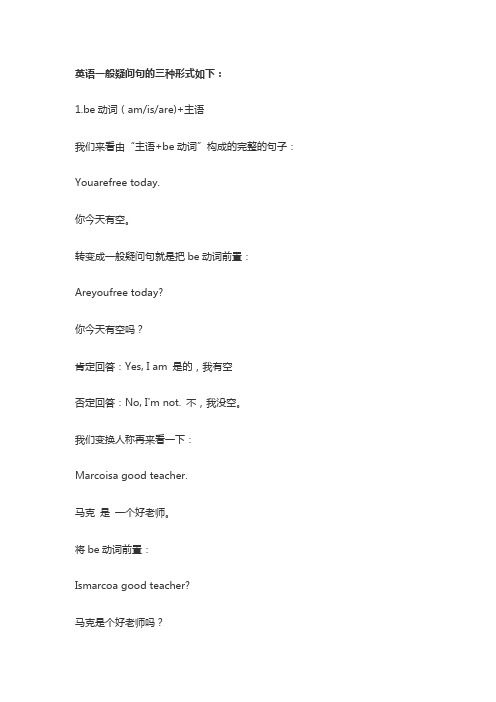
英语一般疑问句的三种形式如下:1.be动词(am/is/are)+主语我们来看由“主语+be动词”构成的完整的句子:Youarefree today.你今天有空。
转变成一般疑问句就是把be动词前置:Areyoufree today?你今天有空吗?肯定回答:Yes, I am 是的,我有空否定回答:No, I'm not. 不,我没空。
我们变换人称再来看一下:Marcoisa good teacher.马克是一个好老师。
将be动词前置:Ismarcoa good teacher?马克是个好老师吗?肯定回答:Yes, he is. 他是否定回答:Nno, he isn't . 不,他不是。
第三人称复数也是一样的变法:Theyare outside the room.他们在房间外面。
Aretheyoutside the room?肯定回答:Yes, they are. 是的。
否定回答:No, they aren't.不是,他们没有在外头。
2.助动词+主语首先我们来看一下助动词都有哪些:will,can,may,must,should,would,could Icanhelp you.我可以帮助你。
转换成一般疑问句,同样是助动词前置:canIhelp you?你可以帮助我吗?肯定回答:Yes, I can. 我可以。
否定回答:No,I can't. 我不可以。
其他人称也是一样的方法:Wemustbe quiet in the classroom.我们必须保持在教室里要安静。
Mustwebe quiet in the classroom?我们必须在教室里保持安静吗?3."动词do/does+动词原形+主语第三种情况“主语+动词”是最特殊的,因为不再是把动词前置,而是要按主语的人称分别使用助动词do或者does,原有的动词一律变成原形。
我们来看一个例子:Marcostudieshard.马克学习刻苦。
英语中的一般疑问句
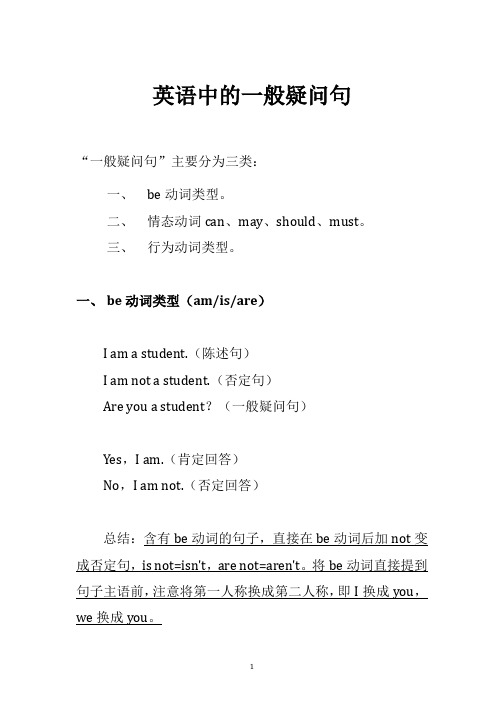
英语中的一般疑问句“一般疑问句”主要分为三类:一、be动词类型。
二、情态动词can、may、should、must。
三、行为动词类型。
一、be动词类型(am/is/are)I am a student.(陈述句)I am not a student.(否定句)Are you a student?(一般疑问句)Yes,I am.(肯定回答)No,I am not.(否定回答)总结:含有be动词的句子,直接在be动词后加not变成否定句,is not=isn't,are not=aren't。
将be动词直接提到句子主语前,注意将第一人称换成第二人称,即I换成you,we换成you。
二、情态动词类型(can/may/should/must)He can play basketball.(陈述句)He can not play basketball.(否定句)Can he play basketball?(一般疑问句)Yes,he can.(肯定回答)No,he can not.(否定回答)总结:含有情态动词的句子,变否定直接在情态动词后加not,变一般疑问句直接将情态动词提前。
三、行为动词类型I go to school by bike.(陈述句)I do not go to school by bike.(否定句)Do you go to school by bike?(一般疑问句)Yes,I do.(肯定回答)No,I do not.(否定回答)She goes to school by bike.(陈述句)She does not go to school by bike.(否定句)Does she go to school by bike?(一般疑问句)Yes,she does.(肯定回答)No,she does not.(否定回答)总结:行为动词变否定和一般疑问需要借助助动词do 或者does,当主语是第三人称单数时,助动词用does。
英语一般疑问句
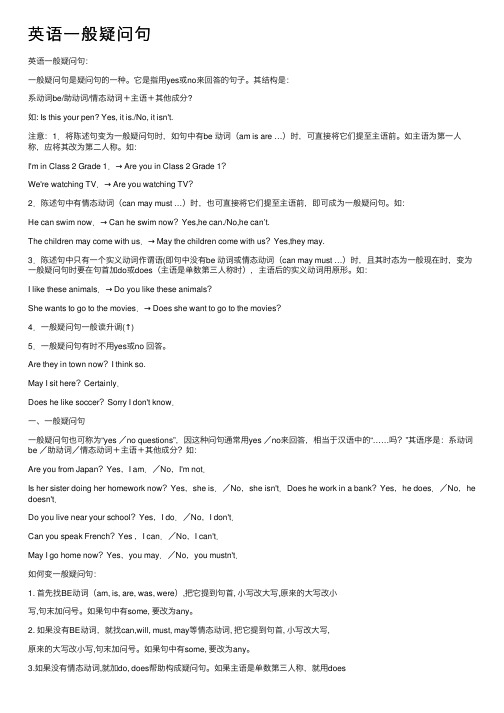
英语⼀般疑问句英语⼀般疑问句:⼀般疑问句是疑问句的⼀种。
它是指⽤yes或no来回答的句⼦。
其结构是:系动词be/助动词/情态动词+主语+其他成分?如: Is this your pen? Yes, it is./No, it isn't.注意:1.将陈述句变为⼀般疑问句时,如句中有be 动词(am is are …)时,可直接将它们提⾄主语前。
如主语为第⼀⼈称,应将其改为第⼆⼈称。
如:I'm in Class 2 Grade 1.→ Are you in Class 2 Grade 1?We're watching TV.→ Are you watching TV?2.陈述句中有情态动词(can may must …)时,也可直接将它们提⾄主语前,即可成为⼀般疑问句。
如:He can swim now.→ Can he swim now?Yes,he can./No,he can’t.The children may come with us.→ May the children come with us?Yes,they may.3.陈述句中只有⼀个实义动词作谓语(即句中没有be 动词或情态动词(can may must …)时,且其时态为⼀般现在时,变为⼀般疑问句时要在句⾸加do或does(主语是单数第三⼈称时),主语后的实义动词⽤原形。
如:I like these animals.→ Do you like these animals?She wants to go to the movies.→ Does she want to go to the movies?4.⼀般疑问句⼀般读升调(↑)5.⼀般疑问句有时不⽤yes或no 回答。
Are they in town now?I think so.May I sit here?Certainly.Does he like soccer?Sorry I don't know.⼀、⼀般疑问句⼀般疑问句也可称为“yes /no questions”,因这种问句通常⽤yes /no来回答,相当于汉语中的“……吗?”其语序是:系动词be /助动词/情态动词+主语+其他成分?如:Are you from Japan?Yes,I am./No,I'm not.Is her sister doing her homework now?Yes,she is./No,she isn't.Does he work in a bank?Yes,he does./No,he doesn't.Do you live near your school?Yes,I do./No,I don't.Can you speak French?Yes ,I can./No,I can't.May I go home now?Yes,you may./No,you mustn't.如何变⼀般疑问句:1. ⾸先找BE动词(am, is, are, was, were),把它提到句⾸, ⼩写改⼤写,原来的⼤写改⼩写,句末加问号。
英语一般疑问句
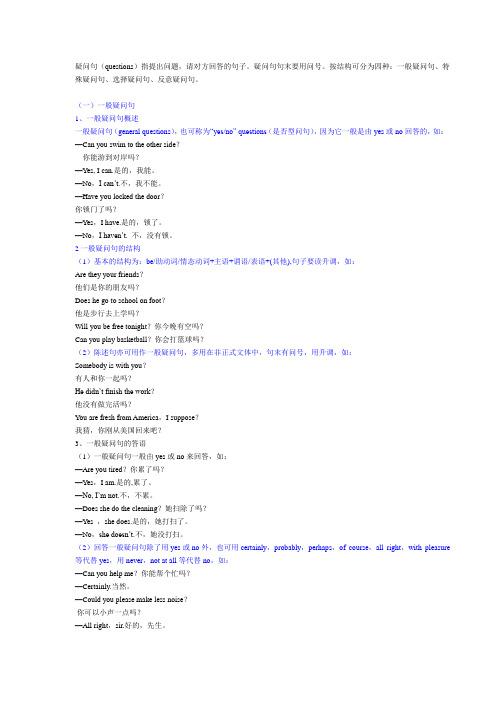
疑问句(questions)指提出问题,请对方回答的句子。
疑问句句末要用问号。
按结构可分为四种:一般疑问句、特殊疑问句、选择疑问句、反意疑问句。
(一)一般疑问句1、一般疑问句概述一般疑问句(general questions),也可称为“yes/no” questions(是否型问句),因为它一般是由yes或no回答的,如:—Can you swim to the other side?你能游到对岸吗?—Yes, I can.是的,我能。
—No,I can’t.不,我不能。
—Have you locked the door?你锁门了吗?—Yes,I have.是的,锁了。
—No,I haven’t. 不,没有锁。
2一般疑问句的结构(1)基本的结构为:be/助动词/情态动词+主语+谓语/表语+(其他),句子要读升调,如:Are they your friends?他们是你的朋友吗?Does he go to school on foot?他是步行去上学吗?Will you be free tonight?你今晚有空吗?Can you play basketball?你会打篮球吗?(2)陈述句亦可用作一般疑问句,多用在非正式文体中,句末有问号,用升调,如:Somebody is with you?有人和你一起吗?He didn’t finish the work?他没有做完活吗?You are fresh from America,I suppose?我猜,你刚从美国回来吧?3、一般疑问句的答语(1)一般疑问句一般由yes或no来回答,如:—Are you tired?你累了吗?—Yes,I am.是的,累了。
—No, I’m not.不,不累。
—Does she do the cleaning?她扫除了吗?—Yes ,she does.是的,她打扫了。
—No,she doesn’t.不,她没打扫。
一般疑问句20个例句英语
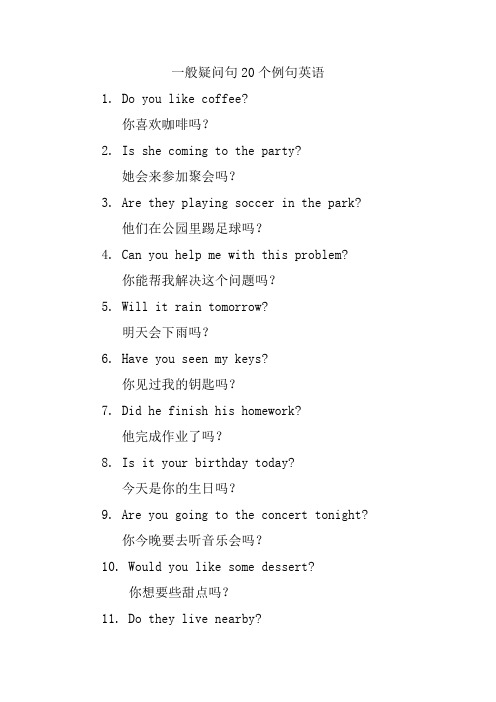
一般疑问句20个例句英语1. Do you like coffee?你喜欢咖啡吗?2. Is she coming to the party?她会来参加聚会吗?3. Are they playing soccer in the park?他们在公园里踢足球吗?4. Can you help me with this problem?你能帮我解决这个问题吗?5. Will it rain tomorrow?明天会下雨吗?6. Have you seen my keys?你见过我的钥匙吗?7. Did he finish his homework?他完成作业了吗?8. Is it your birthday today?今天是你的生日吗?9. Are you going to the concert tonight?你今晚要去听音乐会吗?10. Would you like some dessert?你想要些甜点吗?11. Do they live nearby?他们住在附近吗?12. Is this the right way to the station?这是去车站的正确路吗?13. Can she speak French?她会说法语吗?14. Are we meeting at 6 PM?我们下午6点见面吗?15. Will you join us for dinner?你会和我们一起吃晚餐吗?16. Have you read this book?你读过这本书吗?17. Did they travel abroad last year?他们去年出国旅行了吗?18. Is he a good singer?他是个好歌手吗?19. Are you feeling okay?你感觉好吗?20. Can I borrow your pen?我可以借你的笔吗?。
英语一般疑问句的知识
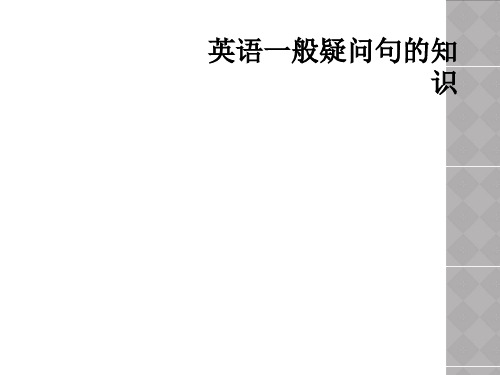
教学资料
• 资料仅供参考
Eg7. We can speak English fluently. → Can you speak English f luently
2、第二家族:含行为动词(或称为实义动词)的句子 秘诀:一加二改三问号
一加:即在句首加助动词Do或Does; 二改:1、把谓语动词改为原形;2、改换主语称谓
六、“some”还是“any”?
在一般疑问句中,要表达“一些”时 , 一般用any,但如果这个问句是用来 表达 “建议、请求、邀请”等交际功
能时 ,应该用some.
七、词语的释义
情态动词
情态动词(Modal verbs)本身有一定的词义, 表示语气的单词。但是不能独立作谓语,只能和 动词原形一起构成谓语。情态动词用在行为动词 前,表示说话人对这一动作或状态的看法或主观 设想。 情态动词虽然数量不多,但用途广泛, 主要有下列: can (could), may (might), must, need, ought to, dare (dared), shall (should), will (would) must not.情态动词无人称和数的变化, 情态动词后面跟的动词须用原形,否定式构成是 在情态动词后面加 "not"。个别情态动词有现在 式和过去式两种形式,过去式用来表达更加客气, 委婉的语气,时态性不强,可用于过去,现在或 将来。情态动词属非及物动词,故没有被动语态。
Eg1. 问句: Is this your English book? 肯答: Yes,it is. 否答: No,it isn`t.
Eg2. 问句: Are these your English books? 肯答: Yes,they are. 否答: No,they aren’t.
英语一般疑问句的概念与构成方法
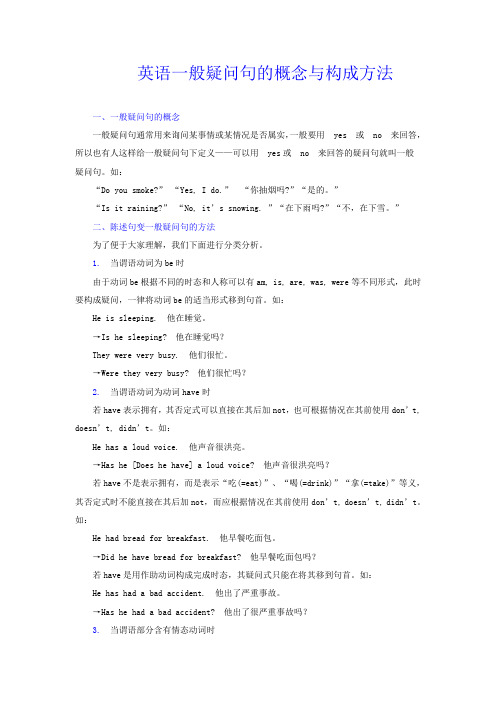
英语一般疑问句的概念与构成方法一、一般疑问句的概念一般疑问句通常用来询问某事情或某情况是否属实,一般要用yes 或no 来回答,所以也有人这样给一般疑问句下定义——可以用yes或no 来回答的疑问句就叫一般疑问句。
如:“Do you smoke?”“Yes, I do.”“你抽烟吗?”“是的。
”“Is it raining?”“No, it’s snowing. ”“在下雨吗?”“不,在下雪。
”二、陈述句变一般疑问句的方法为了便于大家理解,我们下面进行分类分析。
1. 当谓语动词为be时由于动词be根据不同的时态和人称可以有am, is, are, was, were等不同形式,此时要构成疑问,一律将动词be的适当形式移到句首。
如:He is sleeping. 他在睡觉。
→Is he sleeping? 他在睡觉吗?They were very busy. 他们很忙。
→Were they very busy? 他们很忙吗?2. 当谓语动词为动词have时若have表示拥有,其否定式可以直接在其后加not,也可根据情况在其前使用don’t, doesn’t, didn’t。
如:He has a loud voice. 他声音很洪亮。
→Has he [Does he have] a loud voice? 他声音很洪亮吗?若have不是表示拥有,而是表示“吃(=eat)”、“喝(=drink)”“拿(=take)”等义,其否定式时不能直接在其后加not,而应根据情况在其前使用don’t, doesn’t, didn’t。
如:He had bread for breakfast. 他早餐吃面包。
→Did he have bread for breakfast? 他早餐吃面包吗?若have是用作助动词构成完成时态,其疑问式只能在将其移到句首。
如:He has had a bad accident. 他出了严重事故。
英语 一般疑问句
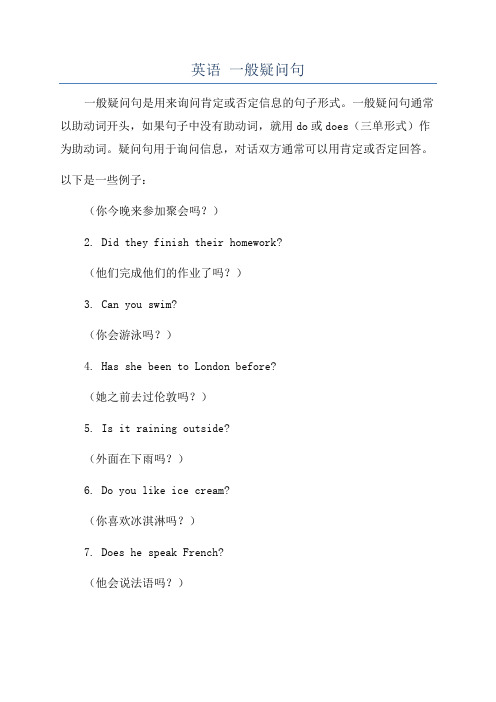
英语一般疑问句
一般疑问句是用来询问肯定或否定信息的句子形式。
一般疑问句通常以助动词开头,如果句子中没有助动词,就用do或does(三单形式)作为助动词。
疑问句用于询问信息,对话双方通常可以用肯定或否定回答。
以下是一些例子:
(你今晚来参加聚会吗?)
2. Did they finish their homework?
(他们完成他们的作业了吗?)
3. Can you swim?
(你会游泳吗?)
4. Has she been to London before?
(她之前去过伦敦吗?)
5. Is it raining outside?
(外面在下雨吗?)
6. Do you like ice cream?
(你喜欢冰淇淋吗?)
7. Does he speak French?
(他会说法语吗?)
请注意,在回答一般疑问句时,通常会根据问题的情况使用"Yes, I do" 或"No, I don't"这类的简短回答。
- 1、下载文档前请自行甄别文档内容的完整性,平台不提供额外的编辑、内容补充、找答案等附加服务。
- 2、"仅部分预览"的文档,不可在线预览部分如存在完整性等问题,可反馈申请退款(可完整预览的文档不适用该条件!)。
- 3、如文档侵犯您的权益,请联系客服反馈,我们会尽快为您处理(人工客服工作时间:9:00-18:30)。
英语一般疑问句:
一般疑问句是疑问句的一种。
它是指用yes或no来回答的句子。
其结构是:
系动词be/助动词/情态动词+主语+其他成分?
如:
Is this your pen?
Yes it is./No it isn't.
注意:
1.将陈述句变为一般疑问句时,如句中有be 动词(am is are …)时,可直接将它们提至主语前。
如主语为第一人称,应将其改为第二人称。
如:
I'm in Class 2Grade 1.→
Are you in Class 2Grade 1?
We're watching TV.→
Are you watching TV?
2.陈述句中有情态动词(can may must …)时,也可直接将它们提至主语前,即可成为一般疑问句。
如:
He can swim now.→
Can he swim now?
The children may come with us.→ May the children come with us?
3.陈述句中只有一个实义动词作谓语且其时态为一般现在时,变为一般疑问句时要在句首加do或does 主语后的实义动词用原形。
如:
I like these animals.→
Do you like these animals?
She wants to go to the movies.→ Does she want to go to the movies?4.一般疑问句一般读升调(↑)
5.一般疑问句有时不用yes或no 回答。
一、一般疑问句
一般疑问句也可称为“yes /no questions”,因这种问句通常用yes /no 来回答,相当于汉语中的“……吗?”其语序是:系动词be /助动词/情态动词+主语+其他成分?如:
Are you from Japan?
Yes I am./No I'm not.
Is her sister doing her homework now?
Yes she is./No she isn't.
Does he work in a bank?
Yes he does./No he doesn't.
Do you live near your school?
Yes I do./No I don't.
Can you speak French?
Yes I can./No I can't.
May I go home now?
Yes you may./No you mustn't.
注意:
1.将陈述句变为一般疑问句时,如句中有be 动词(am is are …)时,可直接将它们提至主语前。
如主语为第一人称,应将其改为第二人称。
如:
I'm in Class 2Grade 1.→
Are you in Class 2Grade 1?
We're watching TV.→
Are you watching TV?
2.陈述句中有情态动词(can may must …)时,也可直接将它们提至主语前,即可成为一般疑问句。
如:
He can swim now.→
Can he swim now?
The children may come with us.→ May the children come with us?
3.陈述句中只有一个实义动词作谓语且其时态为一般现在时,变为一般疑问句时要在句首加do或does 主语后的实义动词用原形。
如:
I like these animals.→
Do you like these animals?
She wants to go to the movies.→ Does she want to go to the movies?4.一般疑问句一般读升调(↑)
5.一般疑问句有时不用yes或no 回答。
如:
Are they in town now?
I think so.
May I sit here?
Certainly.
Does he like soccer?
Sorry I don't know.
6. 一般疑问句的第一单词总是虚词,读的时候要读轻声。
